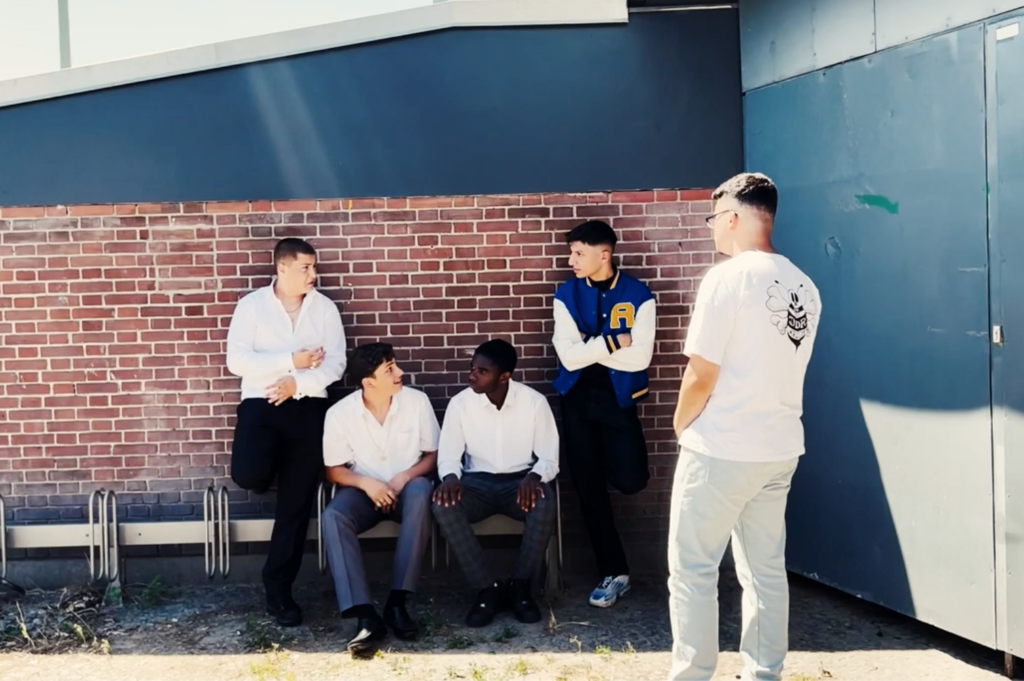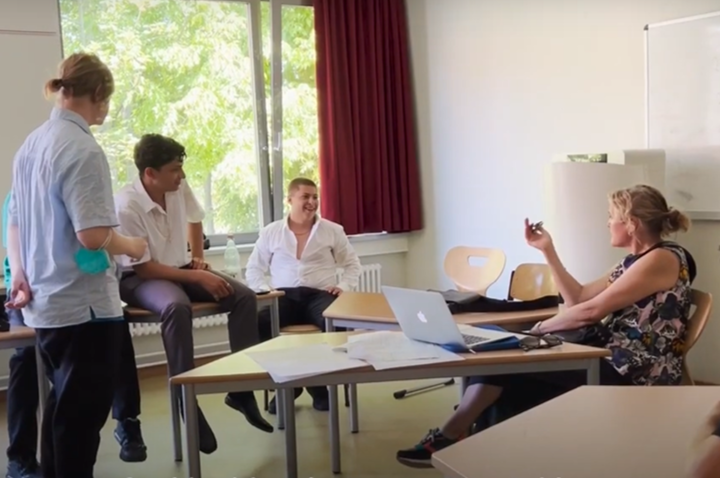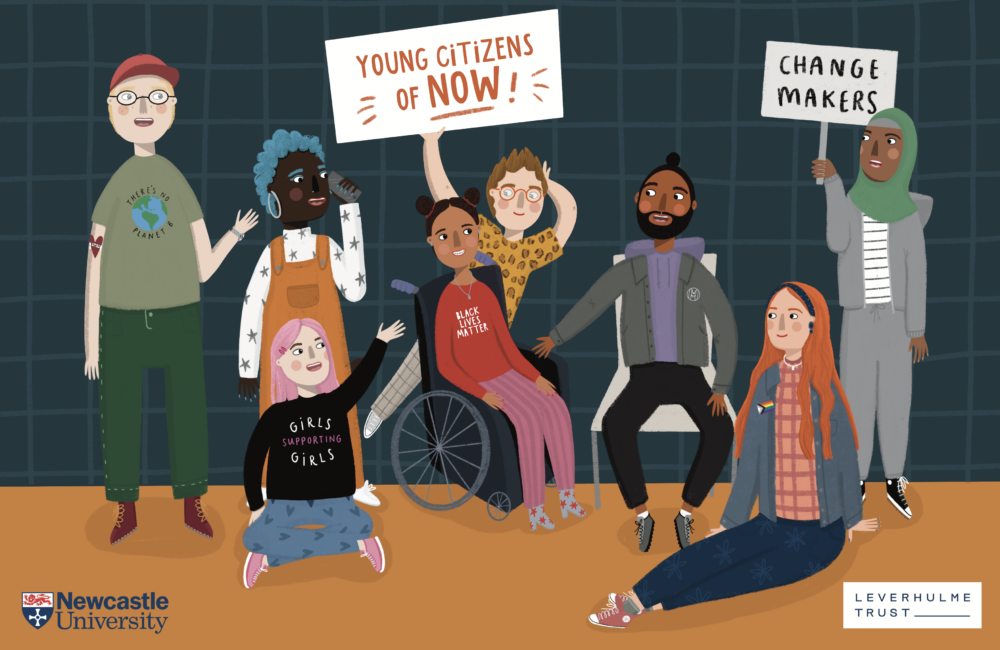Gemeinschaftsschule Campus Efeuweg, Berlin-Neukölln (Gropiusstadt)
Berlin Young People’s Project: Silence Breakers (rap)
Case study – Glücksunterricht (Happiness Lessons)
Run by: Gemeinschaftsschule Campus Efeuweg, Berlin-Neukölln (Gropiusstadt)

Campus Efeuweg recognises the importance of learning beyond the school and the ways in which students, their families and communities are educators and experts in their own right, who have much to teach educators and professionals.
The case study was chosen for two reasons: i) its Campus School model and ii) its Glück (Happiness) lessons.
Campus Efeuweg is a joint urban development and education project in an economically disadvantaged area of Berlin.The campus is made up of different school, sports and leisure facilities. Fences between the facilities had previously acted as barriers. Now a new joint identity is being created, and new sports fields, play areas and meeting points developed. In addition to being used by the school during the day, the site will also be open to the residents of Gropiusstadt in the evening, so that the campus can be used by everyone.
What is a Campus School?
The Campus model is based on networking relationships and openness. The model is viewed as being a potential solution to the development of more equality of opportunity in large urban areas through successful educational pathways across a range of ages, with diverse collaborative partners. Campus schools are social spaces, and cooperate with other organisations, both on the campus and beyond, in order to offer opportunities for learning, perspectives and an understanding of the world. The neighbourhood is seen as a fruitful place for learning, and so it is essential that Campus teachers learn to understand the neighbourhood.
What is The Glück (Happiness) Curriculum?
The teachers at Campus Efeuweg recognised that there was no ‘space’ in the traditional school curriculum for students to talk about their emotions and feelings, to recognise their strengths and to develop personal skills. As a result, teacher Burçak Sevilgen suggested introducing the Glück (Happiness) Curriculum to Campus Efeuweg.
Participation in the Glück (Happiness) lessons enables students to work on their personal skills for 90 minutes once a week in selected classes. Happiness lessons* help students to discover their personal potential and start to identify how they can contribute to their own life satisfaction. Based on their own strengths and values, students learn to develop their self esteem and self confidence, build positive relationships with other people and to shape a successful life.
The Glück project is carried out nationwide by SETHASA gGmbH in cooperation with universities and partners. (*not part of the official curriculum of the federal states).
Berlin Young People’s Project: Silence Breakers (rap and short film)

Following on from what they had learnt in Campus Efeuweg’s Glück (Happiness) lessons, the students developed their own message for policymakers, professionals and communities on their everyday lives, experiences and emotions as a young person in Berlin-Neukölln.
Through their rap and short film, the students clearly convey the vital need for education that helps young people develop solutions for real world problems in the place where they live and supports students in disrupting discourses of deficit, difference and aggression based on negative stereotypes and false narratives that surround the place where they live; in this case, Berlin-Neukölln.
In the short film teachers Christian Bieber and Burçak Sevilgen talk about their school, why and how the Glück (Happiness) lessons were developed and the benefits the lessons bring. Students Diego, Masoud, Maxwell, Omar, Wasim and Damian explain the reasons behind their choice of name, Silence Breakers, and discuss why they think that education such as Glück lessons can help make cities fairer places.
Diego, Masoud, Maxwell, Omar, Wasim and Damian chose the name Silence Breakers to show how Glück (Happiness) lessons have taught them the importance of talking about feelings and emotions and working together to challenge negative stereotypes about Neukölln.
The film follows Diego, Masoud, Maxwell, Omar, Wasim and Damian on their journey as they compose, write and rehearse the rap and plan the short film that they produced with the help of Kontasound.
The Silence Breakers rap stresses the importance of education as a tool for positive change. Their work highlights young people’s key role in building collaborative relationships and developing solutions to make Berlin a fairer, more socially just place.

School: Gemeinschaftsschule Campus Efeuweg, Berlin-Neukölln (Gropiusstadt)
Students: Diego, Masoud, Maxwell, Omar, Wasim and Damian
Teachers: Christian Bieber, Burçak Sevilgen, Erkan Karakya
Creatives: Kontasound
Video editing and production: Flooded Cellar Productions
Video translation and subtitles: Caitlin Bell
Video
Overview of the city
Berlin is the capital of Germany and one of Germany’s 16 states. It is also the largest city in Germany. It is also the second-most populous city proper and the 7th most populous urban region in the European Union.
Berlin’s 2023 population is now estimated at 3,573,938. Berlin has grown by 3,188 in the last year. These population estimates and projections come from the latest revision of the UN World Urbanization Prospects – World Population Review. Those of 30 to under 35 years old form the largest age group.
A social economy
Berlin Senate Department for Economics, Energy and Businesses supports the ‘Social Economy Berlin’ project, with the aim of networking social entrepreneurs, providing education, advice and training to help people develop social economy start-ups and raise awareness of the social economy. In 2023, the Berlin Senate commissioned a report to identify the key features of social enterprise.
Key criteria for ‘what counts’ as social entrepreneurship include having a clear business focus on social and ecological objectives that can help solve societal challenges for the common good and stakeholder relationships that encourage participation and leadership opportunities.
Education and schooling in Berlin
By investing in the school system Berlin is investing in the future: After primary school, there are two equivalent types of school, all-day schools are being expanded and the schools are becoming more responsible. The transition to secondary school follows after the one- to three-year initial phase of school education and generally four more years in a primary school. This transition is also possible after four years if that appropriate levels of performance have been achieved. More information can be found at Berlin.de

